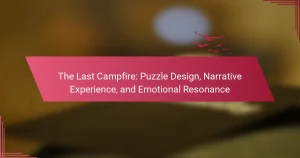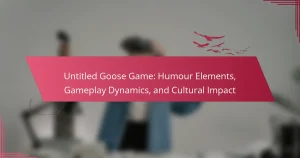Hades combines engaging roguelike features with deep character development and rich mythological influences. Players navigate permadeath and procedural generation while enhancing relationships with gods. The game’s narrative is shaped by Greek mythology, providing a unique backdrop for gameplay. Each run offers new challenges, ensuring strategic depth and replayability.
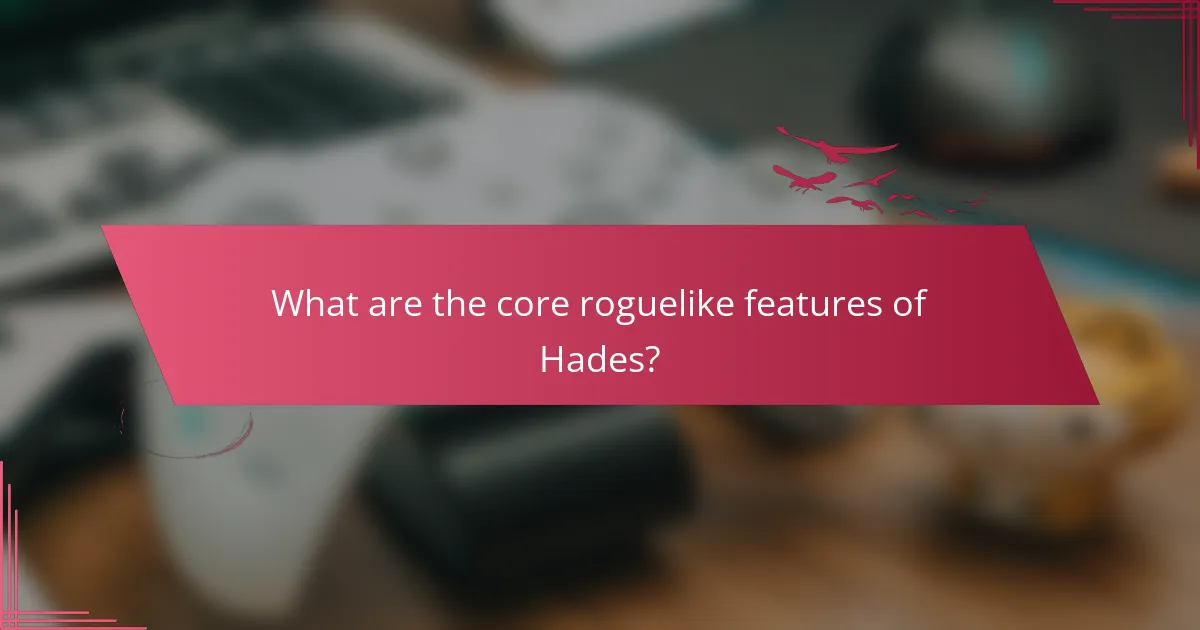
What are the core roguelike features of Hades?
Hades features permadeath, procedural generation, and a rich narrative. Players experience unique character development through the use of boons, weapons, and upgrades. The game incorporates mythological influences, enhancing engagement and complexity. Each run offers different challenges, ensuring replayability and strategic depth.
How does the permadeath mechanic impact gameplay?
The permadeath mechanic significantly heightens the stakes in Hades, enhancing player engagement and strategy. Players face permanent consequences for failure, which fosters a sense of urgency and encourages careful decision-making. This mechanic also deepens character development, as each run allows players to unlock new abilities and story elements, making each attempt unique. Additionally, the narrative consequences of dying and returning to the House of Hades add emotional weight, connecting players to the mythological themes of the game.
What role do randomized levels play in player experience?
Randomized levels significantly enhance player experience in Hades by providing unique challenges and replayability. Each run introduces different layouts, enemies, and rewards, keeping gameplay fresh. This variability encourages exploration of various strategies and character builds. The unpredictability of level design aligns with the game’s roguelike nature, fostering engagement and excitement with each session.
Which upgrades and power-ups are available through the game?
In Hades, players can access various upgrades and power-ups to enhance gameplay. Key upgrades include Boons from Olympian gods, which grant unique abilities and enhance attack options. Players can also acquire upgrades through the Mirror of Night, which provides permanent enhancements like increased health or improved damage. Additional power-ups come from Daedalus Hammers, offering weapon modifications, and various keepsakes that provide bonuses based on the player’s choices. Each upgrade and power-up is designed to deepen the gameplay experience and encourage strategic decisions.
How does the game’s difficulty scale with player progress?
The game’s difficulty scales dynamically with player progress, incorporating various elements that enhance the challenge. As players advance, they encounter tougher enemies and more complex encounters, which require strategic adaptation. The “Heat” system allows players to increase difficulty intentionally, unlocking rewards and encouraging replayability. Unique attributes, such as the variety of weapon aspects and boons, further influence how players experience challenges, making each run distinct. This design keeps the gameplay engaging while rewarding skill development and mastery.
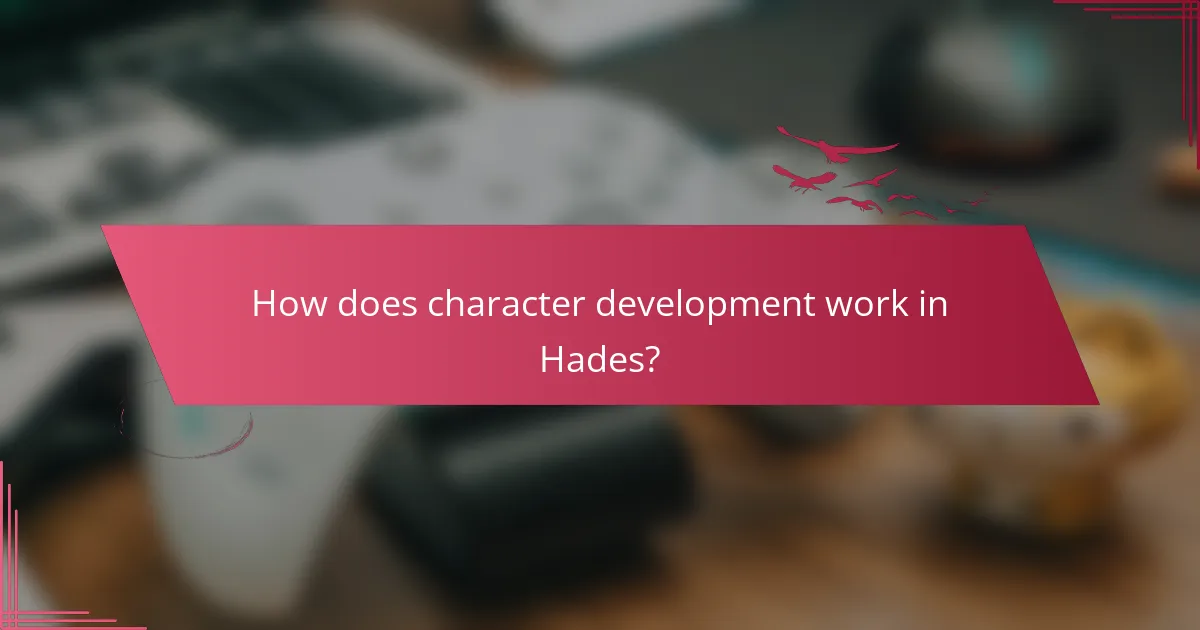
How does character development work in Hades?
Character development in Hades occurs through a combination of narrative progression and gameplay mechanics. Players enhance relationships with gods and characters, unlocking unique storylines and abilities. This development is influenced by the choices made during encounters, which shape character arcs and interactions. The game employs a system of boons and upgrades that reflect the player’s growth, emphasizing both personal and mythological connections. As players progress, they experience deeper insights into the characters, enriching the overall narrative experience.
What are the different character classes and their abilities?
Hades features several character classes, each with unique abilities. The primary classes include Zagreus, the protagonist with balanced combat skills; Achilles, known for high damage output; and Athena, who excels in defensive tactics. Each class offers distinct playstyles and synergies with various weapons and boons, enhancing the roguelike experience.
How do relationships with other characters influence gameplay?
Relationships with other characters significantly enhance gameplay in Hades. They provide unique storylines, unlock abilities, and influence player choices. Each character’s interactions shape the narrative, offering insights into the mythological context and deepening character development. For instance, forging bonds with gods grants boons that modify combat mechanics, thus affecting strategies. These relationships also introduce emotional stakes that engage players, making each run feel unique and impactful.
What strategies can players use to enhance character growth?
Players can enhance character growth in Hades through strategic use of boons, upgrades, and weapon choices. Focus on selecting boons that complement each other for synergy. Prioritize upgrades that enhance core attributes like health and damage. Experiment with different weapons to find playstyles that suit individual strengths. Engage with the narrative to unlock character relationships, which can provide unique benefits. Lastly, utilize resources effectively to maximize growth potential during runs.
Which skills are essential for mastering the game?
Mastering Hades requires skills in strategic combat, resource management, and character progression. Key abilities include adaptability to various play styles, quick reflexes for dodging attacks, and understanding enemy patterns. Familiarity with the game’s mythological references enhances engagement and strategy. Effective use of boons and weapon upgrades significantly impacts gameplay success.
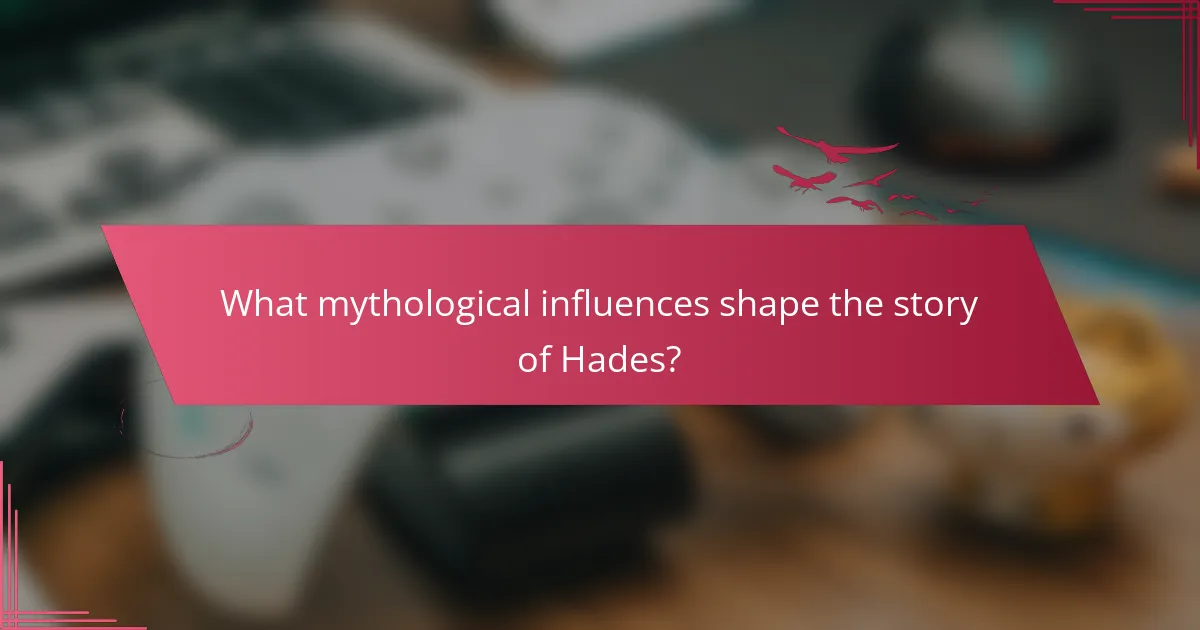
What mythological influences shape the story of Hades?
The story of Hades is shaped by various mythological influences, particularly Greek mythology. Hades, as the god of the underworld, embodies themes of death, the afterlife, and the balance of life and death. His character development in the game reflects these themes through roguelike features that emphasize resilience and exploration. The portrayal of Hades draws from ancient tales, showcasing his relationships with other gods, such as his siblings Zeus and Poseidon, and his abduction of Persephone, which symbolizes the cycle of seasons and life. These elements create a rich narrative that intertwines mythological lore with gameplay mechanics, enhancing player engagement.
How are Greek mythological figures represented in the game?
Greek mythological figures in “Hades” are represented through unique character designs, voice acting, and narrative depth. Each character embodies distinct attributes from mythology, enhancing gameplay and storytelling. For example, Hades, the god of the underworld, showcases power and authority, while characters like Zagreus reflect themes of rebellion and self-discovery. The game intertwines their mythological roots with roguelike mechanics, making each encounter feel fresh and engaging. Additionally, rare attributes, such as character-specific abilities and interactions, deepen player immersion in the mythological narrative.
What themes from mythology are woven into the narrative?
Hades incorporates themes from mythology, particularly the underworld, heroism, and the struggle against fate. Characters like Zagreus reflect the journey of self-discovery, echoing mythological narratives of gods and mortals. The game intertwines these elements through its roguelike mechanics, allowing players to experience repeated trials akin to mythic quests. Additionally, interactions with figures like Persephone and Hades highlight the complexity of familial relationships found in ancient tales.
How does the setting of the Underworld enhance the story?
The setting of the Underworld enhances the story by creating a rich, immersive environment that reflects the themes of fate and choice. Its unique attributes, such as the ever-changing landscapes and mythological references, deepen character development and player engagement. The oppressive atmosphere emphasizes the stakes of each run, making victories feel more significant. Additionally, the Underworld’s design fosters exploration and discovery, allowing players to uncover lore that connects to Greek mythology, enriching the narrative experience.
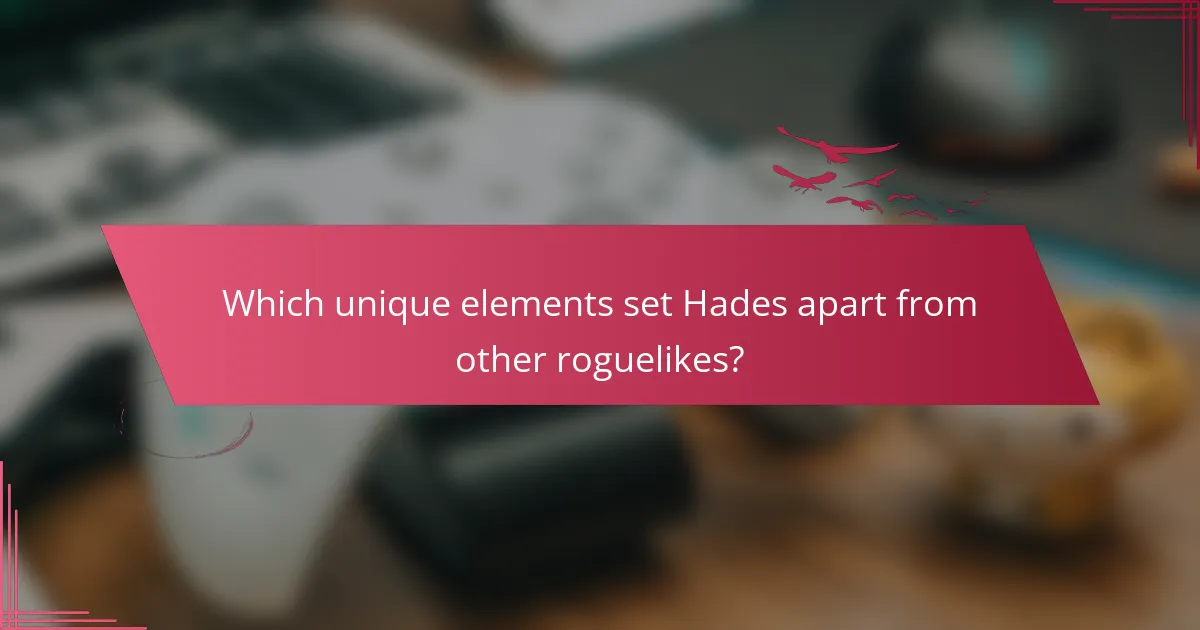
Which unique elements set Hades apart from other roguelikes?
Hades is set apart from other roguelikes through its deep character development, engaging narrative, and integration of Greek mythology. The game allows players to build relationships with characters, enhancing emotional investment. Unique mechanics, such as the use of boons to customize gameplay, provide varied strategies. Additionally, the story unfolds with each run, creating a compelling loop that keeps players engaged.
How does the art style contribute to the game’s identity?
The art style significantly shapes Hades’ identity by blending vibrant colors and fluid animations with Greek mythology. This unique visual approach enhances the game’s immersive atmosphere and emotional depth. The character designs reflect their mythological backgrounds, making each interaction engaging. The art also complements the roguelike mechanics by providing clear visual feedback, ensuring players remain focused during intense gameplay. Overall, the art style is integral to Hades’ narrative and gameplay experience.
What innovative storytelling techniques are used in Hades?
Hades employs innovative storytelling techniques through dynamic dialogue, player-driven narrative choices, and mythological reinterpretations. Character interactions evolve based on player actions, enhancing engagement. The game features a unique approach to storytelling by integrating roguelike mechanics, where each run reveals new narrative layers. This structure allows for a rich exploration of character backstories and relationships, making the experience feel fresh and immersive with every playthrough.
How does player choice affect the narrative outcome?
Player choice significantly influences the narrative outcome in Hades, shaping character interactions and story progression. Each decision impacts relationships with gods and characters, leading to unique dialogue and plot developments. The game’s roguelike structure allows for varied experiences, as choices can alter the narrative path in subsequent runs. This dynamic interplay enhances replayability, inviting players to explore different outcomes based on their choices. The mythological influences further enrich the narrative, providing context for the consequences of player decisions.
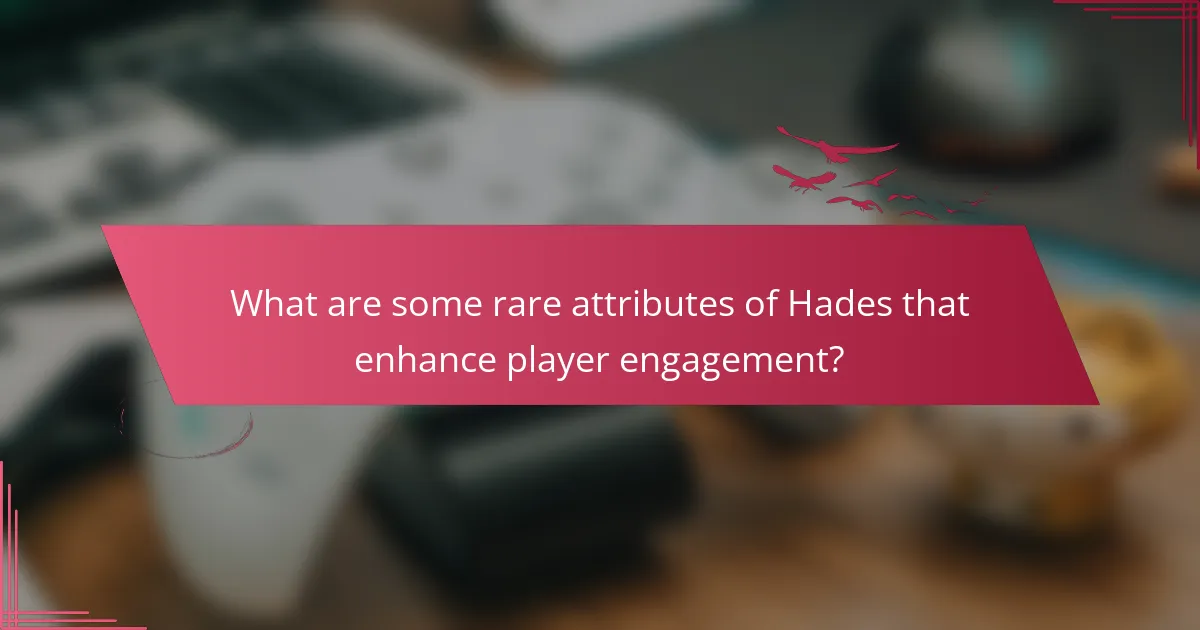
What are some rare attributes of Hades that enhance player engagement?
Hades features several rare attributes that significantly enhance player engagement. Unique narrative arcs deepen emotional connections, while dynamic character interactions create a sense of immersion. The game’s procedurally generated environments keep the gameplay fresh, ensuring that no two runs feel the same. Additionally, the integration of Greek mythology enriches the storyline, appealing to players’ interests in lore and history. These elements collectively foster a compelling gaming experience.
How do seasonal updates and community events influence gameplay?
Seasonal updates and community events significantly enhance gameplay in Hades by introducing new challenges and rewards. These updates often feature unique mechanics, altering the game’s dynamics and encouraging players to adapt their strategies. For instance, limited-time events may offer exclusive items or character interactions, enriching the narrative experience. Additionally, seasonal content fosters community engagement, as players share strategies and achievements, creating a vibrant ecosystem around the game. This interaction not only deepens player investment but also reinforces the mythological themes integral to Hades, connecting players through shared experiences and discoveries.
What unique challenges arise from the game’s design?
Hades’ design presents unique challenges, primarily due to its roguelike structure and character development. The permadeath mechanic forces players to adapt quickly, affecting their strategy and emotional investment. Additionally, the intricate mythological influences create a complex narrative that requires balancing gameplay mechanics with storytelling. This can lead to pacing issues, as players may feel overwhelmed by the lore while navigating gameplay demands. The dynamic interactions between characters also necessitate careful design to ensure meaningful engagement without sacrificing the game’s fast-paced nature.
How does the soundtrack enhance the gaming experience?
The soundtrack significantly enhances the gaming experience in Hades by immersing players in its mythological world. The dynamic score adapts to gameplay, intensifying emotions during battles and exploration. Unique compositions reflect character development, highlighting personal stories and relationships. This interaction between music and narrative deepens player engagement, making each encounter memorable.
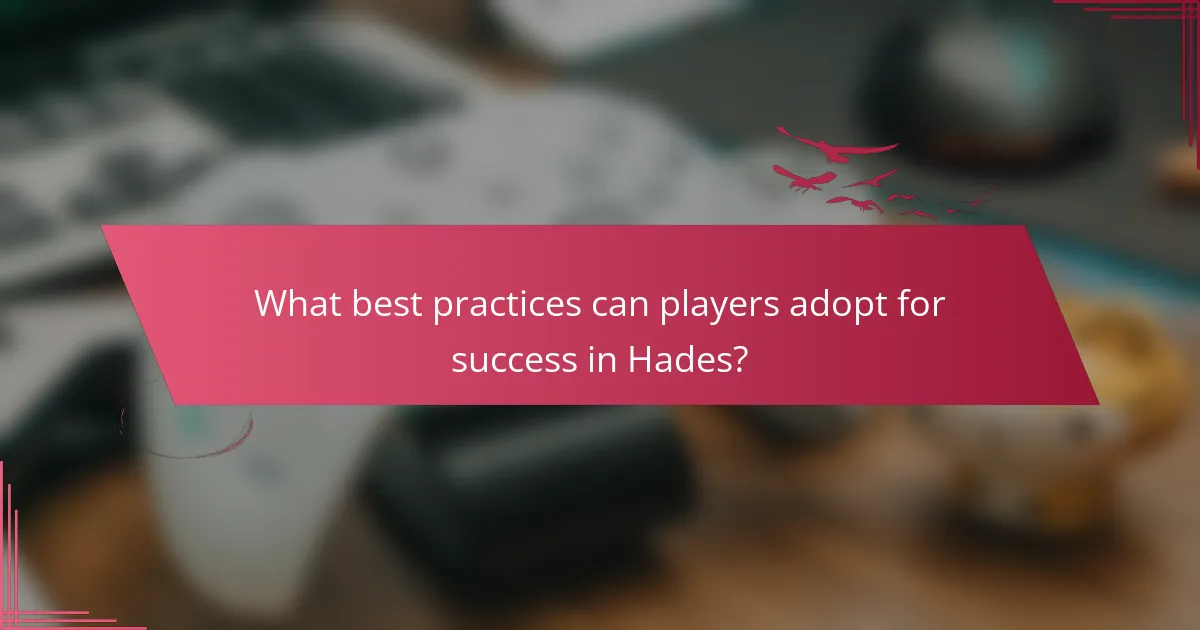
What best practices can players adopt for success in Hades?
To succeed in Hades, players should adopt strategies that enhance their gameplay experience. Focus on mastering weapon mechanics, utilizing boons effectively, and understanding enemy patterns.
1. Experiment with different weapons to find a preferred playstyle.
2. Prioritize upgrading abilities and selecting boons that complement each other.
3. Learn enemy attack patterns to dodge effectively and counterattack.
4. Use resources wisely, such as health items and upgrades, to maintain momentum.
5. Embrace the roguelike nature by adapting strategies with each run.
Which common mistakes should players avoid?
Players should avoid rushing through encounters, neglecting upgrades, ignoring character abilities, and failing to explore the environment. Rushing can lead to unnecessary deaths, while upgrades enhance survivability. Each character has unique abilities that can significantly impact gameplay. Exploring reveals valuable resources and secrets that aid progression.
What tips do experts recommend for new players?
Experts recommend new players focus on mastering combat mechanics, utilizing the dash effectively, and experimenting with different weapon aspects. Understanding the upgrade systems and character interactions enhances gameplay. Additionally, learning enemy patterns and making use of boons strategically can significantly improve performance. Engaging with the story and lore deepens the experience and motivation to progress.
How can players effectively utilize resources for optimal gameplay?
Players can effectively utilize resources by strategically managing upgrades, weapon choices, and character abilities. Focus on collecting and maximizing boons that enhance playstyle. Prioritize synergy between weapons and upgrades to boost combat effectiveness. For example, pairing the Twin Fists of Malphon with speed-enhancing boons increases damage output. Optimize resources by investing in health and damage upgrades, ensuring survivability while maximizing offensive capabilities. Explore various character builds to discover unique strategies that leverage the mythological influences within the game.

